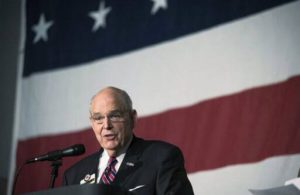Former North Carolina Congressman Robin Hayes’s claim that the United States might win Iraq by preaching Jesus Christ offers a divisive and difficult junction of military strategy, foreign politics, and religion. Such a remark begs basic issues regarding the function of religion proselytisation in international relations, the separation of the state and the church in U.S. foreign policy, and the possible influence of such an approach on the varied religious and cultural scene of Iraq. Analysing Hayes’s ramifications in the field of government and politics depends on knowing the background of his comment, the possible reasons behind it, and the expected repercussions both locally and globally.

Hayes’s Iraq Remarks Reignite Church-State Debate
Possible Foundations for Hayes’ Statement
Hayes’s remarks could result from a strong personal conviction in the transforming potential of Christianity and a confidence that its ideals could provide Iraq stability and peace. From this point of view, the spread of Christianity could be seen as a tool for strengthening a common moral framework and maybe undercutting extreme ideas. Some readings would further connect this point of view to a belief in American exceptionalism, in which American values—often regarded as entwined with Christian principles—are seen as generally desirable and adaptable, even in quite different cultural settings.
Difficulties and Reversals of Such a Method
Hayes’s suggestion is probably going to be highly controversial and presents many major difficulties. First of all, it directly runs counter to the foundation of U.S. government, the separation of church and state. Using the spread of a particular religion as an instrument of foreign policy would blur this important distinction and maybe alienate large sections of the world community. Second, Iraq boasts a rich and varied religious heritage, mostly Muslim, with notable Christian and other minority groups. Presuming a particular religious message could be interpreted as disrespectful of Iraqi sovereignty, culturally insensitive, and possibly offensive, aggravating already high sectarian tensions instead of helping to heal strife.
Religious Influence in Foreign Policy
Although Hayes’s comment is especially forthright, the question of how religion shapes foreign policy is more general and usually hotly contested. Religious principles can affect diplomatic endeavours, humanitarian relief, and knowledge of cultural settings. In a pluralistic and secular international system, the clear encouragement of a particular religion as a method to reach political or military aims is usually seen as problematic, nevertheless. Usually considering the different religious and cultural environments of other countries, foreign policy decisions are based on national interests, security issues, and diplomatic techniques.
Parting Thoughts
Robin Hayes’s claim that promoting the gospel of Jesus Christ will help the United States to win in Iraq offers a point of view that is probably quite divisive and raises major difficulties. Although based on personal conviction, this strategy begs major questions about the separation of church and state, cultural sensitivity, and the basic character of military and political goals. Together with the ideas governing U.S. foreign policy, the intricate religious and cultural tapestry of Iraq shows that such a plan would probably be ineffective and could jeopardise efforts towards security and peace in the region.
Call us for personalized assistance.